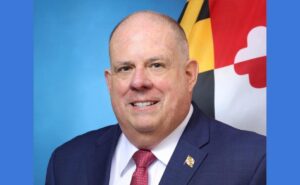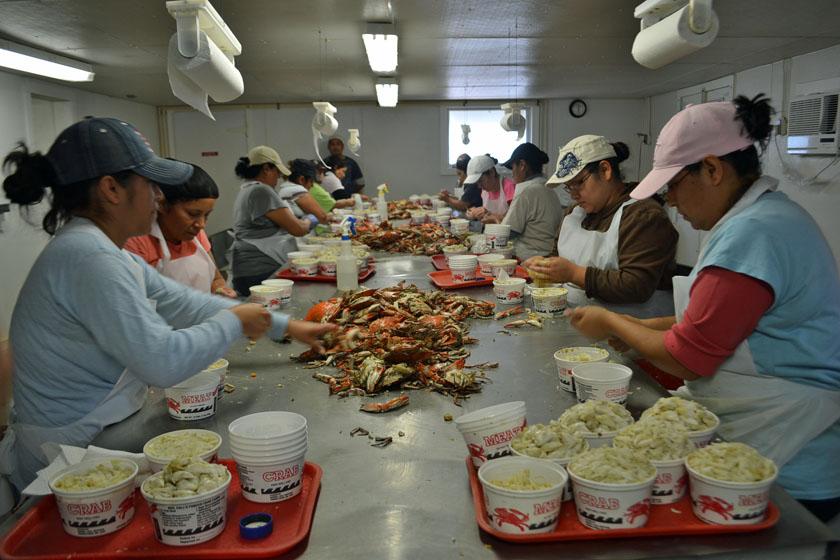With less than a month until the start of the blue crab harvest in Maryland, federal officials have released an additional 35,000 temporary worker visas to help Eastern Shore’s crab picking houses and the seafood industry here and in other states.
The release of the supplemental H-2B visas for the second half of FY2020 comes with “new conditions to protect American workers, provide relief to seasonal employers who truly need it, and reduce fraud and abuse in the program,” the Department of Homeland Security said in a press release.
DHS said the program will “offer an opportunity for nationals of key Central American partner nations to work lawfully in the United States. Of the released H-2B visas, 10,000 are specifically designated for nationals of Guatemala, El Salvador, and Honduras, in support of these countries’ efforts to work with the U.S. to stem the flow of illegal migration in the region and encourage lawful migration to the United States.”
Gov. Larry Hogan, U.S. Sens. Ben Cardin and Chris Van Hollen, and First District Congressman Andy Harris are among those who have been pushing for the supplemental visas, as they have in prior years.
Those officials and DHS agree that Congress needs to make long-term reforms to the H-2B visa program. Visas are released at the start of the fiscal year and quickly allocated, often leaving businesses who don’t need such workers until later — such as the crab processing houses — out of luck.
For the past few years, federal officials have granted requests for the release of supplemental visas to help the Shore’s crab processors and other seafood industries.

Maryland Gov. Larry Hogan
“I am pleased to report that our efforts to make additional H-2B visas available to help our state’s seafood industry have again proven successful,” Hogan said in a press release. “While we still urgently need a long-term solution to this problem, this announcement is welcome relief for our state’s iconic crab processing houses and seafood industry.”
Harris had sent a letter, signed by 151 members of the House and 38 senators, urging Acting DHS Secretary Chad Wolf to release, as quickly as possible, additional H-2B visas to meet seasonal labor demands.
“I applaud the Department of Homeland Security for approving the release of 35,000 supplemental H-2B visas in time for the upcoming summer season,” Harris said in a press release. “This is 5,000 more supplemental visas than had been approved last year.

Rep. Andy Harris, R-Md.-1st
“The record low unemployment rate under the Trump Administration and oversubscription to the H-2B visa program is a debilitating issue for the economy of Maryland’s First Congressional District and the country,” Harris said. “I commend President Trump and Acting Secretary Wolf for providing these extras visas — and I remain committed to working with my colleagues in Congress to pass a permanent solution to the chronic H-2B visa shortage across this country — something that only Congress can do.”
Homeland Security said the department is “taking significant steps to promote integrity in the program, combat fraud and abuse, and ensure the supplemental allocation aligns with the national interest.
“Reform measures include: requiring matching start dates on an H-2B petition and the employer’s start date of need; collaborating with the Department of Labor on increased employer site visits; and, generally limiting the supplemental visas to returning workers, who are known to follow immigration law in good faith.”
The supplemental visas will be made available in two batches to prevent a small handful of employers from using all the visas: 20,000 for start dates beginning April 1, and 15,000 for start dates beginning May 15. Adding a second batch will address specific congressional concerns about late-season filers.
Maryland’s Best Seafood, a marketing program within the Maryland Department of Agriculture, released a survey earlier this week measuring the economic impact of the state’s crab industry and the importance of the federal H-2B temporary visa program.
All eight crab processors surveyed agreed that the current lottery system for awarding temporary visa requests creates uncertainty that hurts their businesses, and that limiting the number of available H-2B visas hurts Maryland’s seafood industry as a whole.
Seven of the eight crab companies indicated that they would not open for the 2020 crab season without adequate H-2B workers.
Without these seasonal workers, the survey showed that income for watermen would drop by $12.5 million; processors would lose $37-$49 million in sales; Maryland would lose 914-1,367 jobs; and the overall hit to the state’s economy could be $100-$150 million.
Federal immigration officials had announced last month that they had doled out the national limit of 33,000 work visas, which are in effect for six months beginning April 1. That was far short of the nearly 100,000 slots that employers had sought to fill.
In Maryland, seafood processors say they received roughly one-third of the 450 visas they need for this season, which also kicks off April 1. The shortage, they warn, could force some of the affected processing plants to close their doors for this season, with the possibility that they might never reopen because their customers and suppliers will have moved on.

Workers pick crabs at Russell Hall Seafood in this file photo.
Several dozen watermen, crab industry leaders and local elected officials gathered March 2 inside a picking house on Hooper’s Island to passionately plead for the Trump administration to release 64,000 more visas, the limit set by Congress on how many can be added.
“I hope everyone can see this is more than a job issue, [it’s] more of an American community issue,” said Aubrey Vincent, sales manager at Lindy’s Seafood on Hooper’s, home to eight of the state’s 20 crab-picking houses. “A lot of these family businesses are holding on by a thread.”
The temporary visas, known as H-2B visas, are made available annually to workers in seafood, landscaping, construction and other seasonal fields. To be eligible, employers must prove there aren’t enough domestic workers willing or able to fill the positions.
For the last 15 years, some picking houses have been left waiting for months to receive their workers or been shut out altogether from the program. In 2018, for example, a new lottery-style allocation system left Dorchester’s processors with a 40% shortfall of foreign workers four months into the season.
So far this year, only three of the county’s nine picking houses have received their workers, businesses say.
The region’s seafood industry blames the visa shortage on increasing competition from other business sectors. But above all, they blame Congress for not heeding their repeated calls to set a higher cap or separate seafood workers into a separate visa class.
“Isn’t this a bunch of B.S. that our government is here trying to put us out of business?” asked A.E. Phillips and Sons CEO Steve Phillips. “It’s stupid. It’s something that can be fixed in five minutes.”
Calls to expand the program face an uphill battle in an administration that has largely moved to constrict both legal and illegal immigration. The issue represents a rare point of conflict between Trump and voters in Dorchester County, which overwhelmingly supported him in 2016.
Some of the Hooper’s Island speakers appealed directly to the president.
“We follow the rules. We do it the right way,” said Jeanne Phillips of Hooper’s Island General Store. “So, please just let us do what we know how to do well. It’s hard enough to keep people in a county like this.
“President Trump, we’re counting on you to keep Hooper’s Island great for many generations to come.”
Staff writer Jeremy Cox of the Bay Journal News Service contributed to this article.

